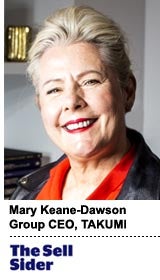“The Sell Sider” is written by members of the media community and contains fresh ideas on the digital revolution in media.
Today’s column is written by Mary Keane-Dawson, group CEO of TAKUMI.
Influencers’ role in society is evolving dramatically, particularly in 2020 which has brought a global pandemic, racial unrest and the most volatile election of our lifetime. Influencers must voice their stances on social and human rights topics, public health, politics and other hot button issues that drive today’s cultural agenda. Silence equates to irrelevancy, or tone deafness.
Our recent research found that 41% of consumers think that influencers should use their platforms to discuss current affairs and everyday activism. However, 55% of marketers said they’d be anxious about working with an influencer who is vocal about social and political issues.
With this tension comes a huge responsibility for influencers to self-regulate and assume a stringent duty of care, in order to protect the general public, as well as the brands they’re working with. Nuanced messaging, factual information sharing, and sensitivity are necessary for influencers to strike the right balance.
Influencers as miniature media outlets
Influencer marketing is still a recent phenomenon, and the rules that govern it have grown quickly. The industry has been, at times, shaken by scandal, misinformation, and questions around what makes an influencer a true subject authority.
And people, home-bound due to the pandemic, spend more of their lives online. They increasingly rely on digital and social networks for updates and entertainment – especially younger consumers who primarily source news updates online.
Consequently, influencers have begun operating as modern-day journalists, and consumers increasingly trust influencers as credible news sources. Our research found that 28% of US consumers are more likely to source news updates and opinions from influencers than journalists and established news outlets, rising to more than a third of 16-24-year-olds (38%), 25-34-year-olds (38%), and 35-44-year-olds (34%).
These changing dynamics mean social media needs to be a source of accurate information, education and positivity. And we believe marketers have a duty of care, and a collective responsibility as global citizens, especially in times of crisis.
The challenge of scaling while maintaining brand safety
Advertisers increasingly recognize the persuasiveness of micro-influencers, who generate huge engagement and trust levels among audiences. Brands with an excess of unspent marketing dollars from cancelled activities in 2020 have turned to influencers as a quick and effective means of marketing. Understandably, many are looking for technology solutions to help them reach critical mass.
Similar to the issues programmatic has faced over the years, there’s a big brand safety risk in working with influencers without closely vetting them.
This process will never be fully automated, as the influencer vetting process must include human insight and a deep understanding of the influencer’s values. We always advise clients that if an influencer has engaged in promoting misinformation or dangerous conspiracy theories e.g., anti-vaxxers, or had an offensive take on a sensitive human rights issue, the brand must discontinue working with that influencer.
The new playbook for influencers and brands
The growing impact influencers have on the public discourse means they need to develop their own code of ethics. Does their content accurately reflect societal realities? Does it encompass the diversity of the industry and its audience? Given their influence, great harm can be done to society if those standards aren’t met.
And a brand hoping to capitalize on an influencer’s high trust level and grow that relationship must understand its tolerance level for influencers’ own opinions – especially those who are outspoken on certain topics and matters. They need to evaluate possible risks and determine how comfortable they are aligning themselves with more provocative personalities.
The ramifications of influencers and brands being sloppy or irresponsible
Those in the influencer industry don’t want to go down the road of negativity and mistrust, which has long surrounded programmatic. The RAND Corporation has warned of America’s “truth decay” as a result of political polarization and a “lack of objective facts and rational discourse.” Discourse on social media often amplifies vitriol and slants information, so influencers have to work extra hard to circumvent this.
In the end, failure to do so will diminish trust in the influencer, brand and the values which they stand for, which are the core reasons that people keep coming back. Trust takes time to build, but is also easily lost, and influencers must take this duty of care extremely seriously in order to keep their industry moving forward on a positive path.
Follow Mary Keane-Dawson (@marykeanedawson ) and AdExchanger (@adexchanger) on Twitter.













